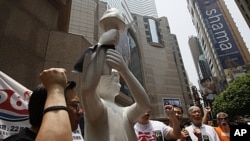China is defending its human rights record on the eve of the 22nd anniversary of the 1989 Tiananmen Square massacre, when hundreds, perhaps thousands, of pro-democracy protesters were killed by security forces. Ahead of this year's June 4 anniversary, relatives of those killed say the Beijing government has been offering them cash compensations.
Some 150,000 people are expected to gather at a candlelight vigil in Hong Kong to commemorate the victims of the Tiananmen crackdown.
Troops backed by tanks crushed the pro-democracy marches on June 4, 1989, causing worldwide condemnation.
China's human rights record has been scrutinized this year after jailed Chinese activist Liu Xiaobo won the Nobel Peace prize. Since then authorities have further cracked down on dissent, jailing lawyers, artists and government critics.
On Friday, the Chinese government brushed off claims that the country is undergoing the worst human rights crackdown since the 1989 massacre.
Foreign Ministry spokesman Hong Lei says the Chinese people enjoy the best human rights conditions in the country's history and have broad political rights.
He warned activists to respect the nation's constitution and other laws. He added that they should exercise their rights within the framework of the law.
Recent pro-democracy movements across the Middle East and North Africa have toppled some authoritarian governments and led to ongoing civil uprisings. The unrest has made the ruling Communist Party extremely nervous about any signs of instability at home.
Since February, security has been dramatically increased and scores of activists, dissidents and lawyers have been silenced or taken away by police, including the outspoken artist Ai Weiwei.
The relaxed reporting restrictions for foreign correspondents during the 2008 Beijing Olympics have since been reactivated and several reporters have been detained or assaulted when covering sensitive news events.
This week 127 mothers of slain activists at the Tiananmen crackdown released a letter ahead of the protest anniversary, saying that on two recent occasions, Chinese public security officials approached them offering cash payments.
Foreign ministry spokesman Hong refused to confirm if the government is indeed offering the mothers compensation.
Ding Zilin is head of the Tiananmen Square Mothers Group, which is demanding a government apology and investigation into what is believed to be several hundred if not thousands of deaths.
She says at the height of the first so-called "Jasmine Revolution" in February, an official from China's Ministry of Public Security visited one of the groups at her home and discussed cash compensation.
She says the official asked how much money the mothers needed. But Ding says the officials would not discuss their request for an inquiry into the killings and an official apology.
China Defends Rights Record Ahead of Tiananmen Square Anniversary




